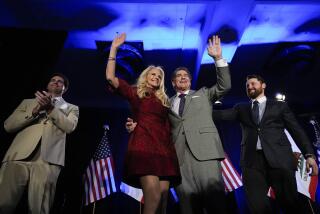State Senate OKs March Primary, but Fate of Bill Still in Doubt
- Share via
SACRAMENTO — The state Senate voted Thursday to move up the date of California’s presidential primary, but ultimate enactment of the switch appeared far from certain.
On a strongly conditional vote of 24 to 11, the Senate sent back to the Assembly a bill that would change the state’s primary from June to March beginning with the 1992 elections.
The vote came after lawmakers were promised that Gov. George Deukmejian and legislative leaders would sit down and try to resolve some of the strong differences legislators have over the early primary plan.
Among the opponents, Senate Majority Leader Barry Keene (D-Benicia) said the vastness of California would make it difficult for “high caliber” candidates to compete here in a long primary season without a lot of money or a gift for attracting publicity.
“They will be outpolled by someone who’s well financed or someone who is extraordinarily media-genic,” Keene said. “Let’s recognize that we risk exporting to national politics what we do wrong here in California.”
Sen. Gary K. Hart (D-Santa Barbara) warned: “California is on the cutting edge of political trends and the political trend is the 30-second spot and a multimillion-dollar campaign.”
But most senators seemed to agree with the basic goal of the legislation, which is to give California a bigger role in choosing the next President. As it stands now, California, the nation’s most populous state, is among the last to hold its presidential primary. By then, the race often is decided.
“Our late primary has made California’s voters irrelevant,” said Sen. Quentin L. Kopp (I-San Francisco), who carried the bill in the Senate.
He and other senators complained that presidential candidates raise millions of dollars in campaign contributions in California, only to spend the money in states that hold earlier primaries.
“California has simply become a gold mine for candidates to mine for money--not for votes, not for ideological purposes, and not for our ideas what this nation should be about,” said Sen. John Garamendi (D-Walnut Grove).
On Monday, the Assembly is expected to vote down the Senate-approved bill, but that will only be a procedural move to set the stage for creation of a two-house conference committee that will attempt to piece together a compromise.
Besides the issue of whether to hold an early primary, lawmakers will have to decide whether to hold one primary or two.
The bill in its current form, drafted by Senate Democrats, would consolidate the presidential primary with state primaries in one big election that would be held on the Tuesday after the first Monday in March.
But Republican legislators anticipate a political and legal donnybrook over redrawing legislative district boundary lines to conform to the 1990 Census and worry that the reapportionment issues will not be resolved by March, 1992. They would like to hold the presidential primary in March but push the state primaries back to September. That would leave just about two months of campaigning before the November general election but give lawmakers most of the year to settle the reapportionment issue.
The idea of a September primary, in turn, raises the hackles of Democrats. Senate President Pro Tem David A. Roberti (D-Los Angeles) rejects the idea of two primaries on the grounds that voters will be bored by the time the second primary is held and not turn out to vote. Democratic candidates generally benefit by larger turnouts.
“A lot of people will be confused having that many primaries,” Roberti said.
The Senate leader admitted that he also has reservations about an early primary, even though he voted for it Thursday. “I’m not excited about it. If I had my druthers, I wouldn’t vote for it,” he told reporters before the vote, blaming National Democratic Party leaders for creating pressure on California to move up its primary.
More to Read
Get the L.A. Times Politics newsletter
Deeply reported insights into legislation, politics and policy from Sacramento, Washington and beyond. In your inbox twice per week.
You may occasionally receive promotional content from the Los Angeles Times.










